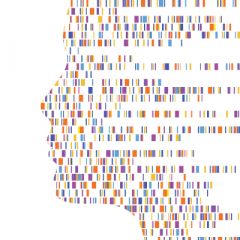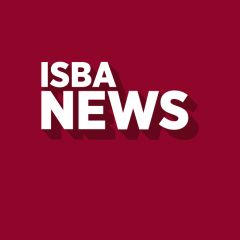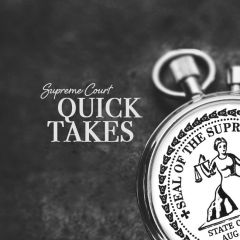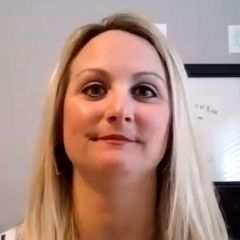Direct-to-consumer (DTC) genetic tests are giving consumers unprecedented, inexpensive access to their genetic predispositions. As a result, state and federal governments have had to grapple with consumer-protection laws and private companies with airtight contracts and clear, conspicuous disclosures. Governments have an interest in robust privacy protections for consumers, yet companies that offer DTC genetic-testing services want to protect their brand and the integrity of their products. The general public stands to benefit significantly from the scientific advancements based on the study of genetic material. But in light of this rapidly growing landscape, what do our client patients, providers, and companies need to know? In her June Illinois Bar Journal article, “Inconclusive Results,” Haley J. Guion provides a history of DTC genetic testing, identifies key stakeholders in the genetic testing market, and outlines corresponding legal principles at issue for these players.
ISBA members, sign up to receive The Bar News' biweekly e-newsletter by emailing emailpreferences@isba.org
-
June 22, 2020 | Practice News

-
June 22, 2020 | ISBA News
 The Illinois State Bar Association (ISBA) Assembly on June 19 approved a resolution that will create an association-wide program to further support and promote equal justice and full equality for all. The resolution’s adoption coincides with Juneteenth, an annual celebration observed on June 19 marking the end of slavery in the U.S. “History is being made today with the adoption of this important resolution,” said ISBA President Dennis J. Orsey. “As the premier bar association in Illinois, the ISBA and its members are uniquely situated to take a leading role in identifying and addressing equal justice issues and ensuring full equity for all."2 comments (Most recent September 7, 2020)
The Illinois State Bar Association (ISBA) Assembly on June 19 approved a resolution that will create an association-wide program to further support and promote equal justice and full equality for all. The resolution’s adoption coincides with Juneteenth, an annual celebration observed on June 19 marking the end of slavery in the U.S. “History is being made today with the adoption of this important resolution,” said ISBA President Dennis J. Orsey. “As the premier bar association in Illinois, the ISBA and its members are uniquely situated to take a leading role in identifying and addressing equal justice issues and ensuring full equity for all."2 comments (Most recent September 7, 2020) -
June 19, 2020 | Practice News
 The Illinois Supreme Court handed down six opinions on Thursday, June 18. In People v. Legoo, the court affirmed a man’s conviction of being a child sex offender in a public park. In People v. Robinson, the court granted a defendant’s leave to file a successive post-conviction petition asserting a claim of actual innocence in a murder trial. In People v. Swenson, the court upheld a man’s conviction for disorderly conduct after he called a school administrator and made extensive comments about shootings and violence during a phone conversation, causing the school to go on lockdown. In People v. Radford, the Supreme Court found that a trial court did not violate a defendant’s right to a public trial by partially closing the courtroom during jury selection and that no error occurred when the jury was instructed. In City of Chicago v. Fraternal Order of Police, Chicago Lodge No. 7, the court ruled that state public information laws require Chicago to preserve decades-old police misconduct records despite a provision in the police union’s collective bargaining agreement. In Hernandez v. Lifeline Ambulance, LLC , the court ruled that section 3.150 of the EMS Act provides no immunity from civil liability to an ambulance owner and its driver where the driver, allegedly speeding, collided with another vehicle en route to pick up a patient for nonemergency transportation.
The Illinois Supreme Court handed down six opinions on Thursday, June 18. In People v. Legoo, the court affirmed a man’s conviction of being a child sex offender in a public park. In People v. Robinson, the court granted a defendant’s leave to file a successive post-conviction petition asserting a claim of actual innocence in a murder trial. In People v. Swenson, the court upheld a man’s conviction for disorderly conduct after he called a school administrator and made extensive comments about shootings and violence during a phone conversation, causing the school to go on lockdown. In People v. Radford, the Supreme Court found that a trial court did not violate a defendant’s right to a public trial by partially closing the courtroom during jury selection and that no error occurred when the jury was instructed. In City of Chicago v. Fraternal Order of Police, Chicago Lodge No. 7, the court ruled that state public information laws require Chicago to preserve decades-old police misconduct records despite a provision in the police union’s collective bargaining agreement. In Hernandez v. Lifeline Ambulance, LLC , the court ruled that section 3.150 of the EMS Act provides no immunity from civil liability to an ambulance owner and its driver where the driver, allegedly speeding, collided with another vehicle en route to pick up a patient for nonemergency transportation. -
June 19, 2020 |
ISBA News
Dennis J. Orsey, a general practice attorney in Granite City who concentrates his practice in representing downstate police and fire pension funds, was installed today as president of the Illinois State Bar Association (ISBA) at the Illinois Supreme Court building in Springfield. He is the first ISBA president elected from Madison County.
-
June 18, 2020 |
ISBA News
Dennis J. Orsey, a general practice attorney in Granite City who concentrates his practice in representing downstate police and fire pension funds, will be installed as president of the Illinois State Bar Association (ISBA) on June 19 by Justice Lloyd Karmeier at the Illinois Supreme Court building in Springfield. Orsey will be the first ISBA president elected from Madison County.
-
June 16, 2020 |
Practice News
Chief Justice Anne M. Burke and the Illinois Supreme Court have announced the appointment of Judge Cara LeFevour Smith as an At-Large Cook County Circuit Judge. Judge LeFevour Smith was appointed to fill the vacancy created by the retirement of Judge Kathleen M. McGury on June 1, 2020. The appointment is effective July 1, and will conclude December 4, 2022, following the November 2022 general election.
-
June 16, 2020 | ISBA News
 In this Quick Takes for Your Practice video, attorney Emily Vivian discusses changing the way you practice during the COVID-19 pandemic.
In this Quick Takes for Your Practice video, attorney Emily Vivian discusses changing the way you practice during the COVID-19 pandemic. -
June 16, 2020 | ISBA News
 In this Quick Takes for Your Practice video, attorney Anisa Jordan discusses client communication, generating business, working from home, and practice criminal law during the COVID-19 pandemic.
In this Quick Takes for Your Practice video, attorney Anisa Jordan discusses client communication, generating business, working from home, and practice criminal law during the COVID-19 pandemic. -
June 15, 2020 |
Practice News
The Illinois Supreme Court Commission on Access to Justice and the Administrative Office of the Illinois Courts have launched an application process for two grant initiatives to begin an expansion of the network of court personnel who assist self-represented litigants (SRLs). The application process for both grant initiatives will open on June 15, 2020 and run through July 15, 2020.
-
June 15, 2020 | CLE
 On May 6, 2020, the Department of Education released new Title IX regulations governing how schools must handle claims of sexual harassment and assault. Join us from 11 a.m. until noon on Friday, June 19 for an online presentation that covers the key aspects of these new regulations and how the regulations impact students and higher education institutions, as viewed from varying perspectives, including an attorney for respondent students, an attorney for colleges and universities, and a retired judge and independent adjudicator. Education law attorneys, family law practitioners, and child law counsel who attend this online seminar will better understand: when and how institutions are required to respond to claims of student-on-student sexual harassment and assault; the procedures institutions must follow when investigating and adjudicating complaints of sexual harassment and assault; and how the new regulations balance the interests of complainants and respondents in sexual misconduct cases.
On May 6, 2020, the Department of Education released new Title IX regulations governing how schools must handle claims of sexual harassment and assault. Join us from 11 a.m. until noon on Friday, June 19 for an online presentation that covers the key aspects of these new regulations and how the regulations impact students and higher education institutions, as viewed from varying perspectives, including an attorney for respondent students, an attorney for colleges and universities, and a retired judge and independent adjudicator. Education law attorneys, family law practitioners, and child law counsel who attend this online seminar will better understand: when and how institutions are required to respond to claims of student-on-student sexual harassment and assault; the procedures institutions must follow when investigating and adjudicating complaints of sexual harassment and assault; and how the new regulations balance the interests of complainants and respondents in sexual misconduct cases.

